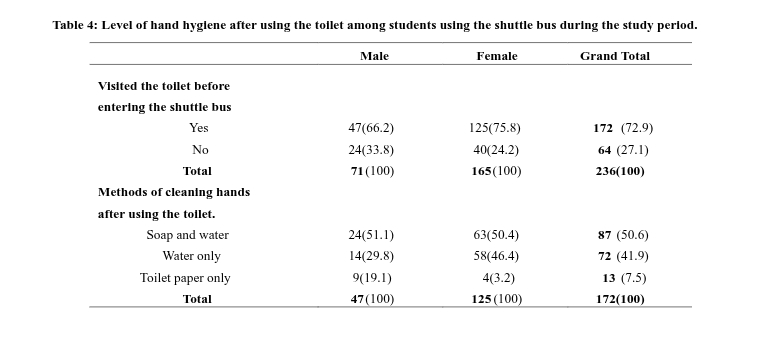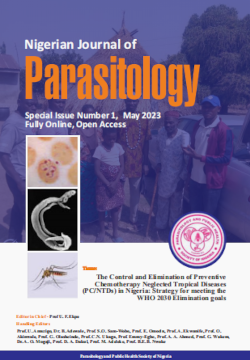Prevalence of Parasites on Door Handles of School Shuttle Buses in Federal University Lokoja, Kogi State, Nigeria.
DOI:
https://doi.org/10.4314/njpar.v46i1.7Keywords:
Parasites, Contamination, Door Handles, Public TransportAbstract
This study was conducted to determine the prevalence of parasites (protozoan cysts and helminths ova) on door handles of school shuttle buses at the Federal University Lokoja, Kogi State, Nigeria, between March and October 2023. A total of 120 samples from the door handles of 20 shuttle buses were analysed using the formol-ether concentration technique to determine the presence of intestinal parasites. Light microscopy was used for morphological identification of parasites. The results showed that out of the 120 samples examined, 31(25.8%) had one or more parasites. The ova of helminth species found were Ascaris lumbricoides 7(13.5%), Strongyloides stercoralis 7(13.5%), Taenia 6(11.5%), Trichuris trichiura 5(9.6%), Fasciola hepatica 3(5.8%), whereas the intestinal protozoan isolates were Entamoeba histolytica 9(17.3%), Iodamoeba butschili 6(11.5%), Giardia lamblia 4(7.7%), Pentatrichomonas hominis 5(9.6%). Out of the six different door handles examined (A to C) for each shuttle bus, the driver exit handle A had the highest prevalence of (30.8%), followed by the passengers’2 entrance handle B (21.2%), passenger exit handle B (17.3%), passengers1 2 entrance handle C (13.5%), driver entrance handle A (11.5%) while passengers1 2 exit handle C had the lowest prevalence of (5.7%). There was a significant2 difference (p=0.04) in the prevalence of parasites contaminating the different door handles. A survey of 236 shuttle bus users revealed that 71 (30.1%) were male and 165 (69.9%) were female, with 172 (72.9%) reporting hand cleaning after toilet use but only 36.9% using soap. This indicates that proper hand washing habits were not practiced. When hands are not washed properly after passing out faeces and are used to touch the door handles of shuttle buses, it leads to contamination with parasitic cysts and ova. The constant use of shuttle buses on school campuses puts students and staff at risk of parasitic infection.
References
Tanko D. (1999): Isolation of parasite ova and cysts from sole of shoes. Department of Biological Science, Ahmadu Bello University, Zaria.
Kramer, A., Schwebke, I. & Kampf, G. How long do nosocomial pathogens persist on inanimate surfaces? A systematic review. BioMedical Central Infectious Diseases, 6, 130 (2006). https://doi.org/10.1186/1471-2334-6-130
Suleiman, M. M. (2005). Diseases prevalent in tropical Africa: Relationship with poverty and ignorance. Nigeria Biological and Environmental Science Journal for the Tropic, 3(2):68-82.
Pozio, E. (2001). New pattern of Trichinella infections. Veterinary Parasitology, 98: 133-148. https://doi.org/10.1016/s0304-4017(01)00427-7
Smith, H. V. (2004). Cryptosporidiosis. In: Manual of Diagnostic Tests and Vaccines for Terrestrial Animals. Organisation Internationale des Epizootes–OIE, Paris, France, pp. 1082–1100.
Oyibo, W., Okangba, C., Ojuromi, T. and Oladosu, O. (2009). Cryptosporidium and other intestinal protozoans in children with diarrhoea in Lagos, Nigeria. The Internet Journal of Tropical Medicine, 5(2), 1-11. https://api.semanticscholar.org/CorpusID:55635433
Smith, H.V. and Paget, T. (2007). Infectious disease: Foodborne disease. Human Press Inc. https://doi.org/10.1001/jama.298.17.1998-b
Luka, A., Suwange, M. P., Eneflok, U. O. (2019). Bacterial Contamination of Door Handles/Knob in Gombe State University, Nigeria. International Journal of Modern Science and Technology, 4(8):204-211. https://nebula.wsimg.com/38d57f063c75754746e182b3075c17b0?AccessKeyId=7F4D485B7198C0BD2695&dispo
sition=0&alloworigin=1
Cheesbrough, M. (2010). District Laboratory Manual for Tropical Countries (2ndEd). University Press, Cambridge, pp. 200-327. chrome-extension://efaidnbmnnnibpcajpcglclefindmkaj/https://www.medbox.org/preview/5255d6e1-05d4-41a9-beb2-02b60e695ecc/doc.pdf
Matur, B. M., Malann, Y. D. and Edhomeriegue, Y. (2009). A survey of parasite cysts, eggs and Bacteria on the Nigerian Currency. New York Science Journal, 2(7) 117-183. https://www.researchgate.net/publication/284697074_A_survey_of_parasite_cysts_eggs_and_bacteria_on_Nigerian_currency_in_FCT_Abuja
Neva, F. A., and Brown, H. W. (2004). Basic Clinical Parasitology, (6th Ed.). Prentice Hall International Inc., USA, pp. 356. https://books.google.com.ng/books/about/Basic_Clinical_Parasitology.html?id=_aFrAAAAMAAJ&redir_esc=y
Asinobi, C. O., Ibe, B. N. A., Nwoke, B. E. B., Ukaga, C. N. and Nwankwo, C. F. (2007). Implications of malaria and intestinal parasitic co-infections among out-patients of a secondary health facility in Owerri, Nigeria. Nigeria Journal of Parasitology, 28 (2): 103-108. https://doi.org/10.4314/njpar.v28i2.37864
Roberts, L., and Janovy, J. (2009). Foundations of parasitology. New York: McGraw Hill. chrome extension://efaidnbmnnnibpcajpcglclefindmkaj/https://vle.upm.edu.ph/pluginfile.php/230883/mod_resource/content/1/foundations%20of%20parasitology.pdf
Ndams, I. S. and Jimoh, O. I. (2006). Prevalence of Parasite Eggs and Cysts on Computer Mouse. Keyboards and Users of Internet Cafes, in Samaru, Zaria, Nigeria. The Zoologist, 1(4):80-85. https://doi.org/10.4314/tzool.v4i1.45216
Orji, N., Esiaka, E., Anyaegbunam, L., Obi, R. and Ezeagwuna, D. (2012). Parasite Contamination of Nigerian Currency (Paper and Polymer Notes) in Ihiala Local Government Area of Anambra State, Nigeria. The Internet Journal of Infectious Diseases, 10 (1): 20-25. https://api.semanticscholar.org/CorpusID:78020929
Ngoda, F. (2017). Assessment of Bacterial contamination of toilet and bathroom door handles/knobs at Daeyang Luke Hospital. Pharmaceutical and Biological Evaluations, 4(4):193-197. http://dx.doi.org/10.26510/2394-0859.pbe.2017.31
Aminu, M., Usman-Sani, H. and Usman, M. A. (2014). Characterization and determination of antibiotic susceptibility pattern of bacteria isolated from some fomites in a Teaching Hospital in Northern Nigeria. African Journal of Microbiology Research, 8(8): 814-818. https://doi.org/10.5897/AJMR2013.6512
Umeanaeto, P. U., Okafor, U. C., Unam, M. C., Ilo, C. C., Okoli, C., Afulukwe, S. C., and Nwakoby, N. E. (2021). Assessment of Parasites and Bacterial Contamination of Office Door Handles in Nnamdi Azikiwe University, Awka, Anambra State. American Journal of Biomedical and Life Sciences, 9(2): 120 - 127. https://doi.org/10.11648/j.ajbls.20210902.13
Moreno, A. C., Filho, A. F., Gomes, T.doA., Ramos, S. T., Montemor, L. P., Tavares, V. C., Filho, L.dosS., Irino, K., and Martinez, M. B. (2010). Etiology of childhood diarrhoea in the northeast of Brazil: significant emergent diarrheal pathogens. Diagnostic microbiology and infectious disease, 66(1), 50–57. https://doi.org/10.1016/j.diagmicrobio.2008.03.017
Andrade, L. M., Teodoro, J. S., Viana, R. A., Barata, E. M., Canuto-Sales, G. H., Bahia-de-Oliveira and Villas-Bôas S. (2017). Intestinal parasites in public transport buses from the city of Diamantina, Minas Gerais, Brazil. Research and Report in Tropical Medicine, 8: 59–63 https://doi.org/10.2147/RRTM.S122046
Pereira, E. B., Rodrigues, S. L., Bahia-de-Oliveira, G. H., Coelho, S. V., Barata, R. A. (2016). Detection of intestinal parasites in the environments of a public school in the town of Diamantina, Minas Gerais State, Brazil. Rev Inst Med Trop São Paulo 58:51. https://doi.org/10.1590/s1678-9946201658051
Damen, J. G., Banwat, E. B., Egah, D. Z., and Allanana, J. A. (2007). Parasitic contamination of vegetables in Jos. Nigeria Annals of African Medicine, 6(3): 115–118. https://doi.org/10.4103/1596-3519.55723
Murta, F. F., and Massara, C. L. (2009). Presença de ovos de helmintos intestinais emônibus de transporte público em Belo Horizonte - Minas Gerais, Bra-sil. [Presence of eggs from intestinal helminths in buses of the public transport system in Belo Horizonte city, Minas Gerais State]. Rev Patol Trop, 38:207–212. https://doi.org/10.5216/rpt.v38i3.7839
Abruqua, A. A., and Lambon, S. P. (2014). Hand hygiene practices- A work place-based survey in Ghana. International Journal of Development and Sustainability, 3(9):1848-186

Downloads
Published
How to Cite
Issue
Section
License
Copyright (c) 2025 Nigerian Journal of Parasitology

This work is licensed under a Creative Commons Attribution-NonCommercial-NoDerivatives 4.0 International License.




